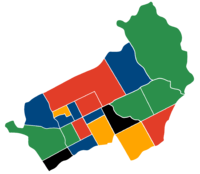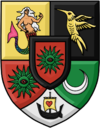Sabioveronese general election, September 2014
| |||||||||||||||||||||||||||||||||||||||||||||||||||||||||||||||||||||||||||||||||||||||||
All 20 seats to the Chamber of Deputies 11 seats needed for a majority | |||||||||||||||||||||||||||||||||||||||||||||||||||||||||||||||||||||||||||||||||||||||||
|---|---|---|---|---|---|---|---|---|---|---|---|---|---|---|---|---|---|---|---|---|---|---|---|---|---|---|---|---|---|---|---|---|---|---|---|---|---|---|---|---|---|---|---|---|---|---|---|---|---|---|---|---|---|---|---|---|---|---|---|---|---|---|---|---|---|---|---|---|---|---|---|---|---|---|---|---|---|---|---|---|---|---|---|---|---|---|---|---|---|
| Turnout | 87% | ||||||||||||||||||||||||||||||||||||||||||||||||||||||||||||||||||||||||||||||||||||||||
| |||||||||||||||||||||||||||||||||||||||||||||||||||||||||||||||||||||||||||||||||||||||||
 Results by legislative district | |||||||||||||||||||||||||||||||||||||||||||||||||||||||||||||||||||||||||||||||||||||||||
| |||||||||||||||||||||||||||||||||||||||||||||||||||||||||||||||||||||||||||||||||||||||||
Sabia and Verona held its fifth general election on 14 September 2014. All 20 members of the Chamber of Deputies, the lower house of the Legislative Courts, were elected for a one-year term. This was the second election since the adoption of the Constitution of 2014, which divided the previously unicameral Courts into the Chamber of Deputies and the Senate.
The incumbent Prime Minister at the time, Léon Galieri, decided not to run for a second term and his party nominated a former Socialist minister, Ernesto DaVilha, as their candidate for Prime Minister.
The election returned the governing coalition to a majority, but since the two parties in the coalition (Galieri's Left Alliance and Convergence) were at odds with each other, Queen Isadora granted her mandate to form a government to Bertrand Rivière, leader of the Unity Party, which was in an alliance with Initiative for Democracy.[1] This was the last election in which the Pashqari People's Party or the Initiative would run, as both dissolved before the 2015 election. It was also the last election before the Haronos Plan would introduce a new constitution.
Background
The September 2014 election was the second legislative election in Sabia and Verona's history to be held under the Constitution of 2014, which divided the Courts of Sabia and Verona into two houses: the Senate and the Chamber of Deputies. The elections covered the 20 seats of the Chamber of Deputies, as the members of the Senate were appointed by the Monarch. Following the March 2014 election, the relationship between the members of the governing coalition, the Convergence Party and the Left Alliance, became strained. Conflict arose between the two ruling parties and the Pashqari People's Party as well, a party that had so far been sympathetic to the government.
Prime Minister Léon Galieri declined serving a second term, emulating his predecessor Ann Stefanović. Instead, his party (the Left Alliance) chose Ernesto DaVilha, a moderate social democrat, as their candidate for Prime Minister. Convergence and Amity chose Étienne Boulin, a former Socialist minister, as their PM-candidate, hoping to appeal to Left Alliance voters. The party that appeared best positioned to win was the Unity Party, which had done poorly in the previous elections. Its new leader, Bertrand Rivière, proved popular among voters and appealed to the electorates in big cities such as Salisse and Caenia.
Rivière rode a wave of Sabian nationalism, attacking the Pashqari and Lycene minorities of the Kingdom and promising to make Sabian the sole language of the Kingdom and Nikolaeist Pahunism the official religion of Sabia and Verona. He counted with the support of the Initiative for Democracy, a center-right liberal party that pledged to back Rivière's premiership. The two parties formed the Road Towards Change (Képren Lâdom) alliance, and their candidates campaigned under that banner.
Electoral system
The September 2014 election was held using the first-past-the-post (FPTP) system in 20 electoral districts. Each municipality was divided into several districts: the largest municipality, Salisse, was divided into four, while the smallest, Lycem (actually a region with a single municipality and a special territory) contained a single district. The system was the same as the one used in the March 2014 election.
Parties and candidates
| Party | Ideology | Leader | PM-candidate | |
|---|---|---|---|---|
| Convergence and Amity (A) | Federalism | Ryam Piper | Étienne Boulin | |
| Unity Party (C) | Conservatism | Bertrand Rivière | ||
| Initiative for Democracy (D) | Liberalism | Ann Stefanović[N 4] | Bertrand Rivière | |
| Left Alliance (R) | Democratic socialism | Léon Galieri | Ernesto DaVilha | |
| Pashqari People's Party (P) | Pashqari people's rights | Lukas Pondstone | José Ramírez | |
Opinion polls
| Pollster | Release date | A | C† | R | P | Other | Lead |
|---|---|---|---|---|---|---|---|
| The SiV Phonograph | 15-06-2014 | 27% | 27% | 31% | 15% | 4% | |
| The SiV Phonograph | 30-06-2014 | 26% | 28% | 31% | 15% | 3% | |
| The SiV Phonograph | 15-07-2014 | 26% | 29% | 28% | 17% | 1% | |
| The SiV Phonograph | 30-07-2014 | 27% | 31% | 27% | 15% | 4% | |
| The SiV Phonograph | 15-08-2014 | 27% | 30% | 29% | 14% | 1% | |
| The SiV Phonograph | 30-08-2014 | 28% | 34% | 27% | 15% | 6% |
- †: Polls counted support for the Unity Party and Initiative for Democracy as the same, using the Képren Lâdom alliance as an umbrella for both parties.
Results

The election resulted in big losses for the governing coalition: the Left Alliance lost half of its seats and Convergence lost one seat. Despite receiving the same amount of votes as the Left, the Unity Party became the largest party in the Chamber of Deputies with 6 seats. The Pashqari People's Party lost one seat as well, while the Initiative for Democracy, which had abstained from participating in March, won 3 seats.
| Party | Leader | Votes | % | Seats | +/– | |
|---|---|---|---|---|---|---|
| Unity Party | Bertrand Rivière | 22 | 25.88% | 6 | ▲2 | |
| Convergence and Amity | Ryam Piper | 20 | 23.53% | 5 | ▼1 | |
| Left Alliance | Léon Galieri | 22 | 25.88% | 4 | ▼4 | |
| Initiative for Democracy | Ann Stefanović | 7 | 8.23% | 3 | ▲3 | |
| Pashqari People's Party | Lukas Pondstone | 13 | 15.29% | 2 | ||
Elected MCs
| District | Deputy | Party | Notes | ||
|---|---|---|---|---|---|
| Abrelia | I Luseknama | Dímeros Grenouille | Unity Party (KL) | Cabinet minister. Judicial Commission. | |
| II Adshaidogaz | Shassel Marlaryen | Pashqari | |||
| III Silverpine | Gonzalo Salomé | Initiative (KL) | Cabinet minister. | ||
| Aguasblancas | I Nel-Berin | Dovedán Pashor | Left Alliance | ||
| II Bal de Or | Oliver Pondstone | Left Alliance | |||
| III Alcabala | François Florent | Unity Party (KL) | Cabinet minister. | ||
| Caenia | I Bois | Osez Kóvérsz | Unity Party (KL) | ||
| II Exnalox | Fernando Goyo-Ramírez | Initiative (KL) | |||
| III Santa Marta | Bertrand Rivière | Unity Party (KL) | Prime Minister. | ||
| Elinore | I Divedrinata | Raphaël Rivière | Unity Party (KL) | ||
| II Godswill | Anton Schubert-Moss | Convergence | |||
| III Miasaaquuri | Roman Häshmun | Pashqari | Judicial commission. | ||
| Lycem | Suipom Goyo | Convergence | Judicial commission. | ||
| Salisse | I Arivenas Bagod | Ernesto DaVilha | Left Alliance | ||
| II Marcaestrella | Étienne Boulin | Convergence | Leader of the Opposition. | ||
| III Agamilox | Nürul Man Baaran | Initiative (KL) | Judicial commission. | ||
| IV Woodstock | Carla Mora | Unity Party (KL) | |||
| Tegula | I Basïsh-el-Amïz | Apollo Cerwyn | Convergence | ||
| II Basïsh-el-Naqäp | Ryam Piper | Convergence | |||
| III Päzar | Andreina Rossini | Left Alliance | Judicial commission. | ||
Aftermath and government formation
Due to the ongoing feud between the parties of the governing coalition and the PMM, Queen Isadora granted Bertrand Rivière the mandate to form a minority coalition government with Initiative for Democracy. Rivière's ministry took office on 1 October 2014, alongside the new Chamber of Deputies.
Notes
- ↑ Étienne Boulin was never leader of Convergence and Amity; instead, he was chosen as Prime Minister-candidate by members of his party. The leader of Convergence and Amity at the time of this election was Ryam Piper.
- ↑ Ernesto DaVilha was never leader of the Left Alliance; instead, he was chosen as Prime Minister-candidate by members of his party. The leader of the Left at the time of this election was Léon Galieri.
- ↑ José Ramírez was never leader of the PMM; instead, he was chosen as Prime Minister-candidate by members of his party. The leader of the PMM at the time of this election was Lukas Pondstone.
- ↑ While Stefanović was officially leader of Initiative for Democracy, she did not contest in any district herself. The role of parliamentary leader for the party after the election was held by Nürul Man Baraan.
References
- ↑ "Conservative victory: Rivière to become Enkâkourak" The SiV Phonograph. 14 September 2014. Retrieved 8 November 2017.





